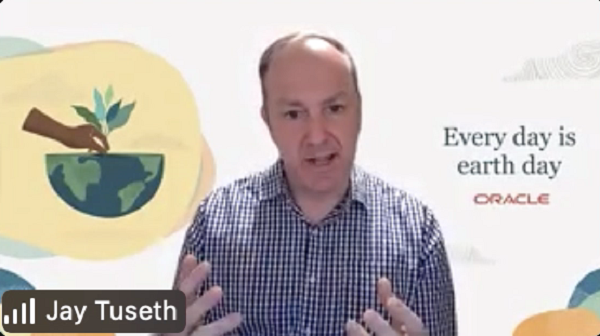Software company Oracle released its latest sustainability study in a virtual media briefing on Thursday, June 23. Based on its findings, now more than ever, it is imperative for businesses to integrate sustainability into their operations and maximize technology to advance sustainability.

The report titled “No Planet B” surveyed over 11,000 businesses leaders across 15 countries, with more than 4,000 respondents from Asia. The software company particularly drew attention to the study’s importance to Asean organizations due to the region’s rich biodiversity that is threatened by environmental issues like rising CO2 emissions and mismanaged plastic waste.
“Without success here and without a successful outcome for the environment here, there is global net damage and global impact that we need to all work together to avoid,” laid out Jay Tuseth, Oracle Asean’s vice president of cloud applications. “So, we want to be a part of that solution from the Oracle perspective because we can really see a lot of the challenges occurring within Asean.”
Besides the long-term risks posed by environmental issues, the research revealed that sustainability should be an immediate concern for Asean businesses because ignoring it could directly impact their customer and talent base.
74% of APAC respondents stated they would walk away from a business that does not take sustainability initiatives seriously and 72% of APAC employees would leave their current workplace for a company that prioritizes them.
Notably, though, the report found that business leaders agree with the public about the gravity of sustainability. It recorded that 91% of APAC leaders even anticipate that organization’s which utilize technology to drive sustainability will be the ones to succeed.
Yet, it also revealed that the same amount of businesses leaders is having difficulty making progress on their sustainability initiatives due to the difficulty of collecting data to track their progress and the time-consuming process of manually reporting on sustainability metrics. Solving these challenges is where technology comes in.
The study found that business leaders believe technology can support an organization’s sustainability efforts. Technology for the respondents can automate data collection from all areas of business, verify the accuracy of the data, as well as plan and revise targets based on performance.
The research even showed the majority of APAC business leaders would prefer a bot’s judgement over a human’s on sustainability decisions. Unlike people, bots are perceived to be bias-free, can be trusted to make rational decisions, and can identify new ways to tackle issues.
“It’s very important, I think, for people to recognize: Everyone sees this as the right path. Everyone understands, or 91% of people at least understand, that technology-enabled processes, technology-enabled decision-making, the ability to aggregate data and leverage technology to understand it and infer meaning from it, is what’s going to drive the right outcomes for society,” stated Tuseth.
Oracle offers a number of its specific technology solutions to help organization’s attain their sustainability goals. In particular, their Oracle Fusion Cloud Applications Suite for Finance and Supply Chain & Manufacturing is billed as an intuitive solution for businesses to budget, forecast, and plan with their supply chain partners, improve efficiency when designing and planning their supply chains, and repurpose information from these activities to drive sustainability goals.




